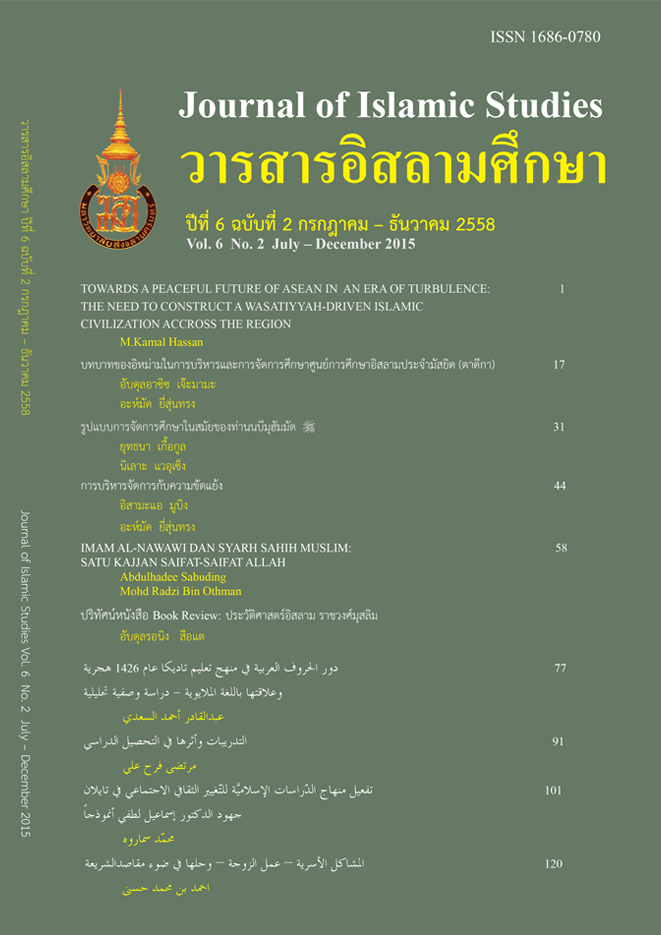Towards a Peaceful Future of Asean in an Era of Turbulence: The Need to Construct a Wasatiyyah-Driven Islamic Civilisation Across The Region
Keywords:
Era of Turbulence, Wasatiyyah-Driven, Islamic Civilisation, Justly Balanced Community, Ummatan WasatanAbstract
Today the phenomenon of “social and moral turbulence” has gone beyond the boundaries of banking and finance to embrace global politics, climate change and environmental disasters, international relations, inter-religious and intra-religious discord, food insecurity scenario, urban crime, lawlessness, and – not least – the daily hazards of living in an environment, system or culture with low standards of moral integrity in many cities of the Muslim world. For the Muslim majority communities of Indonesia, Malaysia and Brunei Darussalam, and the Muslim minorities of the Philippines, Thailand, Singapore, Myanmar, Cambodia, Vietnam and Laos, the way the Islamic culture and civilization are going to develop in the context of ASEAN Economic Community of 2015 and beyond are going to be crucial for the survival of the Muslim ummah as a positive civilizing force. It is hoped that the formation of the ASEAN Community and its consolidation in the coming years would allow for greater public space for Muslim communities to play the role of Rahmatan Li’L-‘Alamin, (Mercy to all Mankind) and Ummatan Wasatan ( Justly Balanced Community) in a shared and enlarged economic and cultural environment, such that the presence of Islam and the Muslim community would be perceived by the non-Muslim communities in ASEAN as a force that represents the message of peace, itahe should be changed respect and cooperation with non-Muslim communities.
References
Abdul Munir Yaacob (1999). Prinsip-Prinsip Pemerintahan dalam Masyarakat Majmuk. Kuala Lumpur: Institut Kefahaman Islam Malayisa.
Abdullah Md. Zain and Khairil Annas Jusoh (2011). Pendekatan Wasatiyyah dalam Menghayati 1 Malaysia. Kuala Lumpur: Kasturi Jingga Corporation Sdn. Bhd.
Abu Bakar Abdul Majeed (2002). Making the Best of Both Worlds. Kuala Lumpur: Institute of Islamic Understanding Malaysia.
Abu Bakar, ‘Ala (2005). Islam Yang Paling Toleran. Jakarta Timur: Pustaka Al- Kautsar.
Baloch, N.A. (2006). Great Books of Islamic Civilization. New Delhi: Kitab Bhavan.
Clammer, John (1996). Values and Development in Southeast Asia. Malayisa: Pelanduk Publications.
Foong, Hui Yew (2013). Encountering Islam: The Politics of Religious Identities in Southeast Asia. Singapore: Institute of Southeast Asian Studies.
Gunaratna, Rohan (et al.) (2013). Countering Extremism Building Social Resilience through Community Engagement. London: Imperial College Press.
H.A. R. Gibb, Hamilton (1962). Studies in the Civilization. Toronto: S. J Refinald Saunders and Co., Ltd.,
Helmanita, Karlina. Abubakar, Irfan. And Afrianty, Dina (eds.) (2004). Dialoge in the World Disorder: A Response to the Threat of Unilateralism and World Terrorism. Jakarta: Pusat Bahasa dan Budaya UIN Syarif Hidayatullah Jakarta and Konrad-Adenauer-Stiftung.
Hilmy, Masdar (2010). Islamism and Democracy in Indonesia: Piety and Pragmatism. Singapore: Institute of Southeast Asian Studies.
Kamar Onaniah Kamaruzaman (2013). Religion and Pluralistic Co-Existence: The Muhibah Perspective (A Collection of Seminar Papers). Kuala Lumpur: IIUM Press.
M. Kamal Hassan (2013). The Need to Understand Al-Wasatiyyah as Part of IIUM Mission of Islamisation. Kuala Lumpur: Centre for Islamisation (CENTRIS).
Mohammad Hashim Kamali (2010). Moderation and Balance in Islam: The Qur’anic Principle of Wasatiyyah. Kuala Lumpur: International Institute of Islamic Studies Malaysia.
Mokhtar Abdullah (2003). Value-Based Total Performance Excellence Model. Kuala Lumpur: Institute of Islamic Understanding Malaysia.
Mokhtar Abdullah, Nooreha Husain, Nik Mustapha Nik Hassan, Mazilan Musa (eds.) (2003). Essays on Islamic Management & Organisational Performance Measurements. Kuala Lumpur: Institute of Islamic Understanding Malaysia.
Moller, Jorgen Orstrom (2011). How Asia Can Shape the World. Singapore: Institute of Southeast Asian Studies.
Muhammad Haniff Hassan (2009). Unlicensed to Kill Countering Imam Samudra’s Justification for the Bali BombingṬ Singapore: Nature Media Pte Ltd.
Najib Tun Razak (2012). Gerakan Moderat Global. Kuala Lumpur: Global Movement of Moderates Foundation.
Nik Mustapha Hj. Nik Hassan (2002). Corporate Governance from the Islamic Perspective. Kuala Lumpur: Institute of Islamic Understanding Malaysia.
al-Qaraḍāwī, Yūsuf (2006). al-܇aḥwah al-Islāmiyyah min al-Murāḥaqah ila al- Rushd. Cairo: Dār al-Shurūq.
al-Qaraḍāwī, Yūsuf (2010). Fiqh al-Wasaܒiyyah al-Islāmiyyah wa al-Tajdīd ((Ma‘ālim wa Manārāt)). Cairo: Dār al-Shūruq.
al-Qāsimi, Mujāhid al-Islām (2000). Ummah Wasaܒ. New Delhi: Ma‘had al- Dirāsāt al-Maudū‘iyyah.
Saat A Rahman (2013). Winning Hearts and Minds, Promoting Harmony A decade of Providing Care and Support. Singapore: The Religious Rehabilitation Group (RRG)
al-Ṣalābī, ‘Alī Muḥammad (1999). al-Wasaܒiyyah fī al-Qur’ān al-Karīm. ‘Ammān: Dār al-Nafāis.
Syed Othman Alhabshi (ed.) (1994). Islam and Tolerance. Kuala Lumpur: Institute of Islamic Understanding Malaysia.
Taher, H. Tarmizi (1997). Aspiring for the Middle Path Religious Harmony in Indonesia. Jakarta: Center for the Study of Islam and Society (CENSIS), IAIN Jakarta.
Zarkasyi, Hamid Fahmi (2012). Misykat: Refleksi Tentang Islam, Westernisasi & Liberalisasi. Singapore: Institute for the Study of Islamic Thought and Civilizations.
Downloads
Published
How to Cite
Issue
Section
License
Copyright (c) 2015 Journal of Islamic Studies, Prince of Songkla University, Pattani Campus

This work is licensed under a Creative Commons Attribution 4.0 International License.
All articles Published in The Journal of Islamic Studies are author’s opinions, and not the responsibility of the Faculty of Islamic Sciences nor the editorial board. However any citation should be referred to the journal.
















